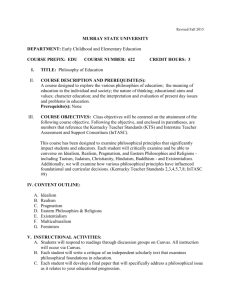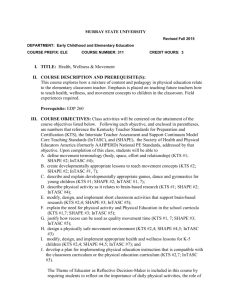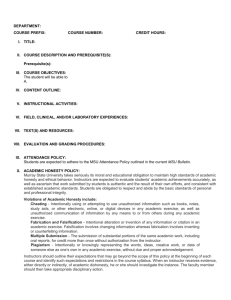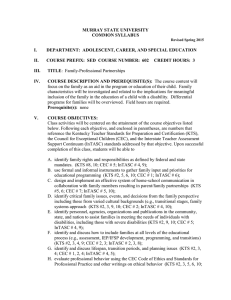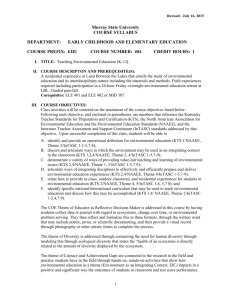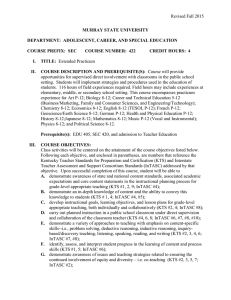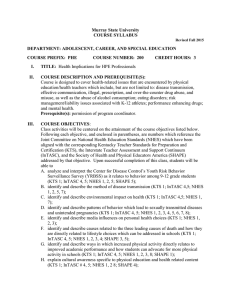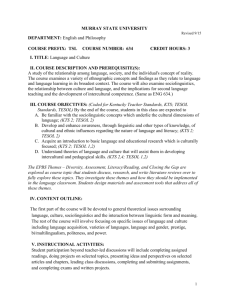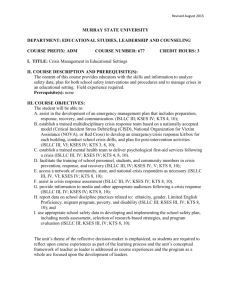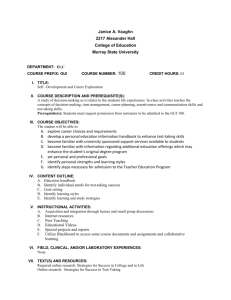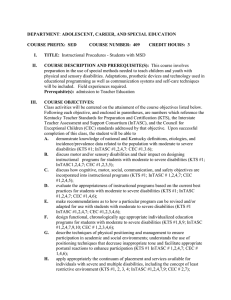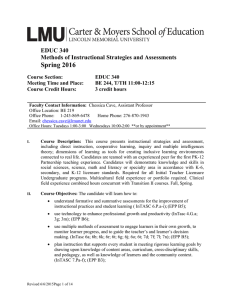MURRAY STATE UNIVERSITY
advertisement
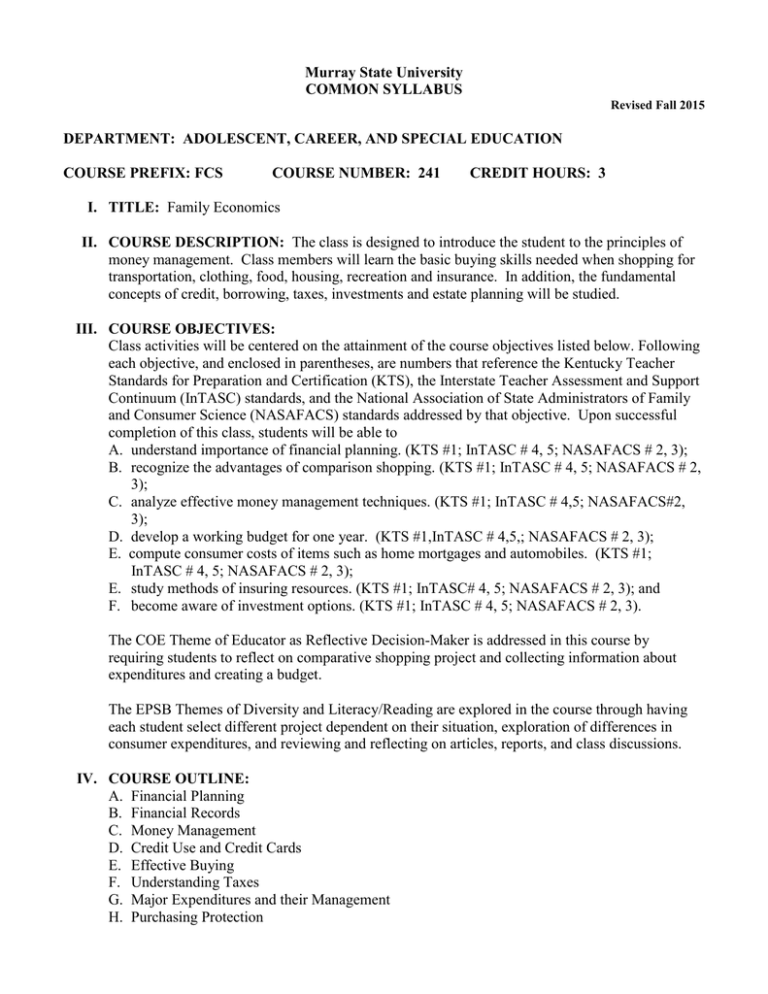
Murray State University COMMON SYLLABUS Revised Fall 2015 DEPARTMENT: ADOLESCENT, CAREER, AND SPECIAL EDUCATION COURSE PREFIX: FCS COURSE NUMBER: 241 CREDIT HOURS: 3 I. TITLE: Family Economics II. COURSE DESCRIPTION: The class is designed to introduce the student to the principles of money management. Class members will learn the basic buying skills needed when shopping for transportation, clothing, food, housing, recreation and insurance. In addition, the fundamental concepts of credit, borrowing, taxes, investments and estate planning will be studied. III. COURSE OBJECTIVES: Class activities will be centered on the attainment of the course objectives listed below. Following each objective, and enclosed in parentheses, are numbers that reference the Kentucky Teacher Standards for Preparation and Certification (KTS), the Interstate Teacher Assessment and Support Continuum (InTASC) standards, and the National Association of State Administrators of Family and Consumer Science (NASAFACS) standards addressed by that objective. Upon successful completion of this class, students will be able to A. understand importance of financial planning. (KTS #1; InTASC # 4, 5; NASAFACS # 2, 3); B. recognize the advantages of comparison shopping. (KTS #1; InTASC # 4, 5; NASAFACS # 2, 3); C. analyze effective money management techniques. (KTS #1; InTASC # 4,5; NASAFACS#2, 3); D. develop a working budget for one year. (KTS #1,InTASC # 4,5,; NASAFACS # 2, 3); E. compute consumer costs of items such as home mortgages and automobiles. (KTS #1; InTASC # 4, 5; NASAFACS # 2, 3); E. study methods of insuring resources. (KTS #1; InTASC# 4, 5; NASAFACS # 2, 3); and F. become aware of investment options. (KTS #1; InTASC # 4, 5; NASAFACS # 2, 3). The COE Theme of Educator as Reflective Decision-Maker is addressed in this course by requiring students to reflect on comparative shopping project and collecting information about expenditures and creating a budget. The EPSB Themes of Diversity and Literacy/Reading are explored in the course through having each student select different project dependent on their situation, exploration of differences in consumer expenditures, and reviewing and reflecting on articles, reports, and class discussions. IV. COURSE OUTLINE: A. Financial Planning B. Financial Records C. Money Management D. Credit Use and Credit Cards E. Effective Buying F. Understanding Taxes G. Major Expenditures and their Management H. Purchasing Protection I. Financial Planning for the Future V. INSTRUCTIONAL ACTIVITIES: A. Lecture B. Discussion C. Evaluation D. Comparison shopping projects, financial plans E. Videos, computer programs, internet VI. FIELD, CLINICAL, AND/OR LABORATORY EXPERIENCES: none VII. TEXT(S) AND RESOURCES: Boone, L., Kurtz, D., & Hearth, D. (2006). Planning your financial future. 4th ed. Cincinnati, OH: Wadsworth Cengage Learning Library materials Resource persons Computer materials VIII. GRADING PROCEDURES: Examination schedule Comparison shopping, budget plans, other assignments & reading will be assigned during the semester with due dates. Grade scale: 90-100% = A; 80-89% = B; 70-79% = C; 60-69% = D; 59% or below = E IX. ATTENDANCE POLICY: This course adheres to the attendance policy published in the current MSU Undergraduate Bulletin. X. ACADEMIC HONESTY POLICY: Murray State University takes seriously its moral and educational obligation to maintain high standards of academic honesty and ethical behavior. Instructors are expected to evaluate students’ academic achievements accurately, as well as ascertain that work submitted by students is authentic and the result of their own efforts, and consistent with established academic standards. Students are obligated to respect and abide by the basic standards of personal and professional integrity. Violations of Academic Honesty include: Cheating - Intentionally using or attempting to use unauthorized information such as books, notes, study aids, or other electronic, online, or digital devices in any academic exercise; as well as unauthorized communication of information by any means to or from others during any academic exercise. Fabrication and Falsification - Intentional alteration or invention of any information or citation in an academic exercise. Falsification involves changing information whereas fabrication involves inventing or counterfeiting information. Multiple Submission - The submission of substantial portions of the same academic work, including oral reports, for credit more than once without authorization from the instructor. Plagiarism - Intentionally or knowingly representing the words, ideas, creative work, or data of someone else as one’s own in any academic exercise, without due and proper acknowledgement. Instructors should outline their expectations that may go beyond the scope of this policy at the beginning of each course and identify such expectations and restrictions in the course syllabus. When an instructor receives evidence, either directly or indirectly, of academic dishonesty, he or she should investigate the instance. The faculty member should then take appropriate disciplinary action. Disciplinary action may include, but is not limited to the following: 1) Requiring the student(s) to repeat the exercise or do additional related exercise(s). 2) Lowering the grade or failing the student(s) on the particular exercise(s) involved. 3) Lowering the grade or failing the student(s) in the course. If the disciplinary action results in the awarding of a grade of E in the course, the student(s) may not drop the course. Faculty reserve the right to invalidate any exercise or other evaluative measures if substantial evidence exists that the integrity of the exercise has been compromised. Faculty also reserve the right to document in the course syllabi further academic honesty policy elements related to the individual disciplines. A student may appeal the decision of the faculty member with the department chair in writing within five working days. Note: If, at any point in this process, the student alleges that actions have taken place that may be in violation of the Murray State University Non-Discrimination Statement, this process must be suspended and the matter be directed to the Office of Institutional Diversity, Equity and Access. Any appeal will be forwarded to the appropriate university committee as determined by the Provost. XI. NON-DISCRIMINATION POLICY STATEMENT: Policy Statement Murray State University endorses the intent of all federal and state laws created to prohibit discrimination. Murray State University does not discriminate on the basis of race, color, national origin, gender, sexual orientation, religion, age, veteran status, or disability in employment, admissions, or other provision of services and provides, upon request, reasonable accommodation including auxiliary aids and services necessary to afford individuals with disabilities equal access to participate in all programs and activities. For more information, contact the Executive Director of Institutional Diversity, Equity and Access, 103 Wells Hall, Murray, KY 42071. 270-809-3155 (voice), 270-809-3361 (TDD). Students with Disabilities Students requiring special assistance due to a disability should visit the Office of Student Disability Services immediately for assistance with accommodations. For more information, students should contact the Office of Student Disability Services, 423 Wells Hall, Murray, KY 42071. 270-809-2018 (voice) 270-809-5889(TDD). XII. FLAG SYSTEM/CONTINUOUS ASSESSMENT: Student progress is continuously assessed throughout the teacher preparation program. Appropriate professional characteristics and dispositions, in addition to academic achievement, are assessed. Positive and negative flags are submitted by faculty to Teacher Education Services and then presented to admissions committees. Negative flags are carefully reviewed to make a determination as to whether a student should be denied admission OR if a professional development plan will be designed for the student’s progress towards program completion. NEGATIVE FLAGS MAY BE GROUNDS FOR DENIAL OF ADMISSION TO TEACHER EDUCATION AND/OR STUDENT TEACHING.
